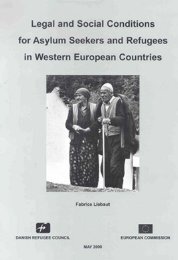Bulgaria - The social impact of seasonal migration
Bulgaria - The social impact of seasonal migration
Bulgaria - The social impact of seasonal migration
You also want an ePaper? Increase the reach of your titles
YUMPU automatically turns print PDFs into web optimized ePapers that Google loves.
18<br />
<strong>The</strong> NSI declares that its experts have executed a monographic investigation <strong>of</strong> all the<br />
migrants, but the results <strong>of</strong> it have not yet been published.<br />
<strong>The</strong> considerable discrepancy between the size <strong>of</strong> <strong>Bulgaria</strong>n out-<strong>migration</strong> established<br />
through the two different methodological tools <strong>of</strong> NSI (border information and the censuses)<br />
has not been addressed meaningfully in the expert literature. In the conclusion <strong>of</strong> his book<br />
Out-<strong>migration</strong> <strong>of</strong> the population in <strong>Bulgaria</strong>, published in 2001, Kalchev reverts to the<br />
border information trends, disregarding the census figures and regardless <strong>of</strong> the fact<br />
that border observations ceased in 1996. His summary is that net <strong>migration</strong> from<br />
<strong>Bulgaria</strong> for the period 1989-1996 is negative and is between 580-600 000 persons. For the<br />
whole period <strong>of</strong> 1989-2000, the prognostic net <strong>migration</strong> should be 640-670 000, and this<br />
number is calculated on the basis <strong>of</strong> expected im<strong>migration</strong> <strong>of</strong> 50-60 000 foreign citizens<br />
to <strong>Bulgaria</strong> in 1996-2000 only (Kalchev 2001, 213-4). <strong>The</strong> discrepancy between the<br />
statistical data does require explanation. On the one hand, it makes it impossible to<br />
account correctly for the e<strong>migration</strong> flows from <strong>Bulgaria</strong> during the last decade. On the<br />
other, it demonstrates the ultimate need <strong>of</strong> a unified methodology and closer<br />
coordination between the institutions dealing with <strong>migration</strong> issues in order to be able<br />
to establish with a better precision the size, direction and pr<strong>of</strong>ile <strong>of</strong> <strong>migration</strong> flows.<br />
<strong>The</strong>re are no reliable data on the number <strong>of</strong> <strong>Bulgaria</strong>n emigrants abroad per country either.<br />
<strong>The</strong> State Agency for <strong>Bulgaria</strong>ns Abroad, which is the state institution entitled to collect<br />
data about and implement the governmental policy towards <strong>Bulgaria</strong>ns abroad, has no<br />
concept <strong>of</strong> "emigrant" and works with the notion <strong>of</strong> "<strong>Bulgaria</strong>ns abroad". According to a<br />
high-ranking <strong>of</strong>ficial in the Agency (interview No. 1), the new law on <strong>Bulgaria</strong>ns living<br />
outside <strong>of</strong> <strong>Bulgaria</strong> (<strong>of</strong> 11 April 2000) introduces the concept <strong>of</strong> "<strong>Bulgaria</strong>n community<br />
abroad". It is divided in 3 groups:<br />
a) old, traditional, historical diaspora, consisting <strong>of</strong> the heirs <strong>of</strong> people who emigrated<br />
before 1878, the year when <strong>Bulgaria</strong> gained its independence from the Ottoman empire,<br />
and <strong>Bulgaria</strong>ns left outside <strong>of</strong> the boundaries <strong>of</strong> the state due to political reasons and<br />
unsuccessful wars. Such are the <strong>Bulgaria</strong>ns in Bessarabia, Crimea, Russia, Kazakhstan,<br />
Moldova, Romania, Northern Greece, Macedonia, Albania, Serbia and Montenegro.<br />
b) contemporary diaspora, formed during the 20th century. Those are economic and<br />
sometimes political emigrants, who possessed <strong>Bulgaria</strong>n citizenship at the time <strong>of</strong><br />
<strong>migration</strong>. <strong>The</strong>y include emigrants after the two world wars, settled in Europe, North<br />
and Latin America, Argentina, Australia, etc., and a newer diaspora, formed after 1989.<br />
c) persons <strong>of</strong> non-<strong>Bulgaria</strong>n origin, residing abroad, but who constitute part <strong>of</strong> the<br />
<strong>Bulgaria</strong>n national and cultural identity. Such are the <strong>Bulgaria</strong>n Turks, Jews and Roma.<br />
<strong>The</strong>y had <strong>Bulgaria</strong>n citizenship at the time <strong>of</strong> <strong>migration</strong> (and might still keep it), speak<br />
the <strong>Bulgaria</strong>n language and are <strong>of</strong> <strong>Bulgaria</strong>n socio-cultural identity.<br />
According to the Agency’s representative, there might appear a fourth group, too. Its<br />
members would be people who are gradually turning to <strong>Bulgaria</strong>n consciousness as a<br />
result <strong>of</strong> their ancient roots, like the <strong>Bulgaria</strong>ns in Tatarstan for example.<br />
<strong>The</strong> number <strong>of</strong> <strong>Bulgaria</strong>ns settled abroad after 1989 is not known, says the same<br />
representative <strong>of</strong> the Agency, because there is no unequivocal concept <strong>of</strong> "emigrant".<br />
<strong>The</strong> <strong>Bulgaria</strong>n consular <strong>of</strong>fices abroad cannot account for the size <strong>of</strong> the <strong>Bulgaria</strong>n<br />
communities there, for the migrants are not obliged to register at the <strong>Bulgaria</strong>n<br />
embassies. <strong>The</strong> Agency maintains contacts with 350 organisations <strong>of</strong> <strong>Bulgaria</strong>ns abroad,<br />
yet completely disregards the problem with irregular <strong>Bulgaria</strong>n citizens there.<br />
According to its <strong>of</strong>ficials, the rights <strong>of</strong> such people should be exercised within the local

















